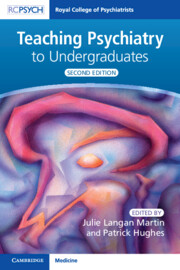Book contents
- Teaching Psychiatry to Undergraduates
- Teaching Psychiatry to Undergraduates
- Copyright page
- Contents
- Contributors
- Section 1 Principles of Medical Education
- Section 2 The Undergraduate Psychiatry Curriculum: Planning and Delivery
- Section 3 Clinical Placements in Psychiatry
- Section 4 Formal Teaching
- Section 5 Materials Development
- Section 6 Gathering feedback and quality improvement
- Section 7 Student Welfare
- Chapter 7.1 The Student in Difficulty
- Chapter 7.2 What Do I Do?
- Chapter 7.3 Raising Awareness and Promoting Well-Being
- Section 8 Developing as a medical educator
- Index
- References
Chapter 7.3 - Raising Awareness and Promoting Well-Being
from Section 7 - Student Welfare
Published online by Cambridge University Press: 12 October 2022
- Teaching Psychiatry to Undergraduates
- Teaching Psychiatry to Undergraduates
- Copyright page
- Contents
- Contributors
- Section 1 Principles of Medical Education
- Section 2 The Undergraduate Psychiatry Curriculum: Planning and Delivery
- Section 3 Clinical Placements in Psychiatry
- Section 4 Formal Teaching
- Section 5 Materials Development
- Section 6 Gathering feedback and quality improvement
- Section 7 Student Welfare
- Chapter 7.1 The Student in Difficulty
- Chapter 7.2 What Do I Do?
- Chapter 7.3 Raising Awareness and Promoting Well-Being
- Section 8 Developing as a medical educator
- Index
- References
Summary
There is a growing body of evidence that suggests that mental health problems are over-represented in medical schools. Studies have shown that there are multiple factors that contribute to this, such as the duration and nature of the course and maladaptive coping strategies in medical students such as self-medication. However, stigma and a ‘culture of shame’ are formidable barriers to mental healthcare services and consequently many medical students with mental health difficulties continue to suffer in silence despite the availability of effective treatment. Medical schools must therefore raise awareness of the importance of mental health, promote wellbeing, and pioneer innovative programmes that reduce mental health related stigma. Data from recent research has revealed that programmes comprised of an Expert by Personal and Professional Experience (EEPE) (i.e. psychiatrists who have recovered from mental health problems) are associated with statistically significant reductions in mental health related stigma in medical students.
- Type
- Chapter
- Information
- Teaching Psychiatry to Undergraduates , pp. 181 - 188Publisher: Cambridge University PressPrint publication year: 2022

